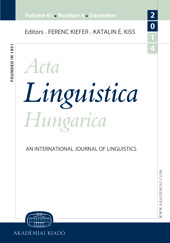Word order and focusing effects in the memory representation of Hungarian sentences
Word order and focusing effects in the memory representation of Hungarian sentences
Author(s): Csaba Pléh, Balázs SinkovicsSubject(s): Syntax, Semantics, Finno-Ugrian studies
Published by: Akadémiai Kiadó
Keywords: Hungarian sentence structure; focusing; sentence memory; memory for meaning; word order and memory; paraphrase in memory;
Summary/Abstract: In two acoustic sentence recognition experiments the relative importance of recognition times (0 to 40 seconds) and relationships between the target sentence and test sentences were varied. Hungarian promised to be a good testing ground for traditional theories that claim that while form is readily forgotten, sentence meaning is preserved. In Hungarian, the informational structure of sentences allows for clear contrasts between neutral and meaning-related order variations. In the stimulus material, target sentences were compared in recognition scores with identical, neutral word order, paraphrased, and focused sentence pairs. The results partly support our starting hypotheses, but partly show that the intricacies of Hungarian sentential syntax call for a more reserved and more carefully qualified expression of the initial proposals of Sachs (1967) and Johnson-Laird and Stevenson (1970). Focused sentences are clearly contrasted with non-focused initial targets even after 40 seconds. It seems that the information structure of Hungarian sentences is somehow maintained in the long-term memory system. In accordance with the classical results, meaning-neutral word order variations are misrecognized in about 60 per cent after 16 seconds already. Contrary to our hypothesis, even after 40 seconds, paraphrases were correctly recognized more than 60 per cent of the time. Thus, to clarify memorial paraphrase equivalence to cross-linguistic validity, more types of sentential paraphrases should be compared. The study supports the main ideas underlying the experiments: the informational structure of the Hungarian sentence seems to be retained in long-term memory, unlike neutral word order variations. This finding calls for a more detailed study with more varied stimulus materials to clarify some further issues of what is ‘form’ and what is ‘meaning’ for the memory system.
Journal: Acta Linguistica Hungarica (Since 2017 Acta Linguistica Academica)
- Issue Year: 58/2011
- Issue No: 1
- Page Range: 120-133
- Page Count: 14
- Language: English

